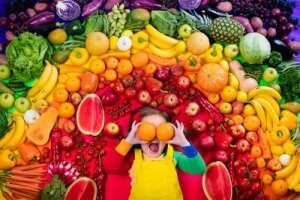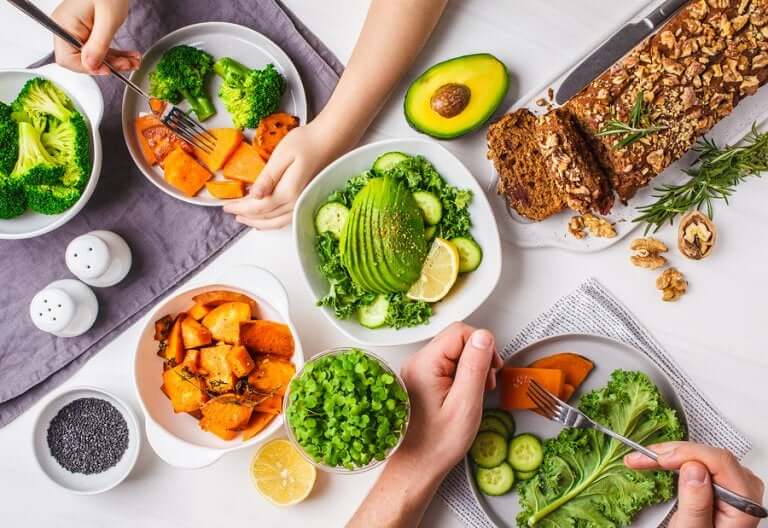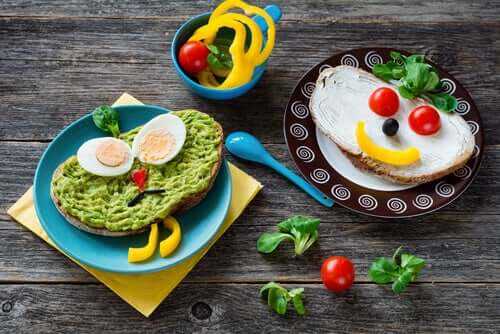My Child Wants to Become a Vegetarian: Is It Safe?

If your child has decided that he or she wants to become a vegetarian and you want to know if it’s safe to do so, then we recommend that you continue reading this article.
What is a vegetarian diet?
The first thing we need when dealing with this new situation is to know what vegetarianism consists of. We must also identify what type of vegetarian diet your child wants to follow, as there are different types. In this article, we’re going to focus on the two most common ones: the vegetarian and vegan diets.
The vegetarian diet is one in which you don’t consume meat nor fish. However, you can eat dairy products, eggs, and other similar food sources of animal origin. However, the vegan diet, also known as the strict vegetarian diet, excludes all food of animal origin.
Why become a vegetarian?
There are different reasons why we decide to follow these types of diets. The most frequent reasons are respect towards animals, environmental awareness, and health.

Whatever the reason why your child has decided to change his diet, our advice is not to worry unduly about his decision. Read up on it, and ask for advice from nutrition experts if necessary. They will provide you with all the information you need for your child to be able to follow this diet.
Is a vegetarian diet suitable for children?
According to the American Academy of Nutrition and Dietetics, these diets are appropriate for all stages of life. These include pregnancy, lactation, childhood, adolescence, and adulthood. They’re even suitable for athletes.
However, in just the same way as in omnivorous diets, you must plan them well. You should also adapt them to the individual needs of each child. If we follow these simple guidelines then the vegetarian or vegan diets can not only be adequate, but could also provide health benefits for the prevention and treatment of certain diseases.
Could I suffer some nutritional deficiency with the vegetarian diet?
As long as the diet is varied, as we said earlier, and well planned out, then the nutrients in the food should be sufficient to cover all nutritional requirements. However, some micronutrients such as iron, omega 3 fatty acids and, especially, vitamin B12 require special attention.
Vitamin B12
Vitamin B12, also known as cyanocobalamin, is found only in foods of animal origin – meat, fish, eggs, and dairy products. Because of this, in the case of vegans, supplementation is essential.
Those who follow a vegetarian diet can get B12 through the consumption of milk and eggs. However, the truth is that it isn’t always easy to reach the recommended levels. Therefore, as a precaution, supplements are also recommended.
Iron
In the case of iron, we don’t have the same problem, as it’s not only found in foods of animal origin. Vegetables such as legumes, seeds, and nuts, among others, also contain this mineral.
Something to be taken into account here is the type of iron that each food contains and its bioactivity (the proportion which enters the body in order for it to have the required effect).

Is it safe for my child to start a vegetarian diet?
While heme iron of animal origin is absorbed between 20% and 25%, the non-heme iron present in plant foods has a more variable absorption (between 1 and 20%) and its bioactivity is influenced by other components of the diet.
But, don’t worry, here are some recommendations to promote the absorption of vegetable iron:
- Consume iron-rich foods such as lentils, spinach, Swiss chard, pistachios, and sunflower seeds, along with foods rich in vitamin C such as bell pepper, broccoli, kiwi, persimmon, and citrus fruits.
- Avoid consuming coffee, tea or chocolate until 1-2 hours after main meals.
- Avoid consuming calcium supplements until 2 hours after your main meal.
Omega 3
This is an essential fatty acid, and is something you need to include in your diet on a regular basis. In omnivorous diets, its main source is blue fish, so you might think that the diets that exclude this food are deficient in Omega 3. However, this isn’t the case, since we can obtain this fat from nuts, seeds and flax oil and chia seeds.
We hope this article has helped you to see that if your child decides to become a vegetarian then, with a careful diet, he or she can live a perfectly healthy life.
If your child has decided that he or she wants to become a vegetarian and you want to know if it’s safe to do so, then we recommend that you continue reading this article.
What is a vegetarian diet?
The first thing we need when dealing with this new situation is to know what vegetarianism consists of. We must also identify what type of vegetarian diet your child wants to follow, as there are different types. In this article, we’re going to focus on the two most common ones: the vegetarian and vegan diets.
The vegetarian diet is one in which you don’t consume meat nor fish. However, you can eat dairy products, eggs, and other similar food sources of animal origin. However, the vegan diet, also known as the strict vegetarian diet, excludes all food of animal origin.
Why become a vegetarian?
There are different reasons why we decide to follow these types of diets. The most frequent reasons are respect towards animals, environmental awareness, and health.

Whatever the reason why your child has decided to change his diet, our advice is not to worry unduly about his decision. Read up on it, and ask for advice from nutrition experts if necessary. They will provide you with all the information you need for your child to be able to follow this diet.
Is a vegetarian diet suitable for children?
According to the American Academy of Nutrition and Dietetics, these diets are appropriate for all stages of life. These include pregnancy, lactation, childhood, adolescence, and adulthood. They’re even suitable for athletes.
However, in just the same way as in omnivorous diets, you must plan them well. You should also adapt them to the individual needs of each child. If we follow these simple guidelines then the vegetarian or vegan diets can not only be adequate, but could also provide health benefits for the prevention and treatment of certain diseases.
Could I suffer some nutritional deficiency with the vegetarian diet?
As long as the diet is varied, as we said earlier, and well planned out, then the nutrients in the food should be sufficient to cover all nutritional requirements. However, some micronutrients such as iron, omega 3 fatty acids and, especially, vitamin B12 require special attention.
Vitamin B12
Vitamin B12, also known as cyanocobalamin, is found only in foods of animal origin – meat, fish, eggs, and dairy products. Because of this, in the case of vegans, supplementation is essential.
Those who follow a vegetarian diet can get B12 through the consumption of milk and eggs. However, the truth is that it isn’t always easy to reach the recommended levels. Therefore, as a precaution, supplements are also recommended.
Iron
In the case of iron, we don’t have the same problem, as it’s not only found in foods of animal origin. Vegetables such as legumes, seeds, and nuts, among others, also contain this mineral.
Something to be taken into account here is the type of iron that each food contains and its bioactivity (the proportion which enters the body in order for it to have the required effect).

Is it safe for my child to start a vegetarian diet?
While heme iron of animal origin is absorbed between 20% and 25%, the non-heme iron present in plant foods has a more variable absorption (between 1 and 20%) and its bioactivity is influenced by other components of the diet.
But, don’t worry, here are some recommendations to promote the absorption of vegetable iron:
- Consume iron-rich foods such as lentils, spinach, Swiss chard, pistachios, and sunflower seeds, along with foods rich in vitamin C such as bell pepper, broccoli, kiwi, persimmon, and citrus fruits.
- Avoid consuming coffee, tea or chocolate until 1-2 hours after main meals.
- Avoid consuming calcium supplements until 2 hours after your main meal.
Omega 3
This is an essential fatty acid, and is something you need to include in your diet on a regular basis. In omnivorous diets, its main source is blue fish, so you might think that the diets that exclude this food are deficient in Omega 3. However, this isn’t the case, since we can obtain this fat from nuts, seeds and flax oil and chia seeds.
We hope this article has helped you to see that if your child decides to become a vegetarian then, with a careful diet, he or she can live a perfectly healthy life.
All cited sources were thoroughly reviewed by our team to ensure their quality, reliability, currency, and validity. The bibliography of this article was considered reliable and of academic or scientific accuracy.
- Martínez Biarge, M. Niños vegetarianos, ¿niños sanos? En: AEPap (ed.). Curso de Actualización Pediatría 2017. Madrid: Lúa Ediciones 3.0; 2017. p. 253-68
- Melina V, Craig W, Levin S. Position of the Academy of Nutrition and Dietetics: Vegetarian Diets. J Acad Nutr Diet. 2016 Dec;116(12):1970-1980. doi 10.1016/j.jand.2016.09.025.
This text is provided for informational purposes only and does not replace consultation with a professional. If in doubt, consult your specialist.








